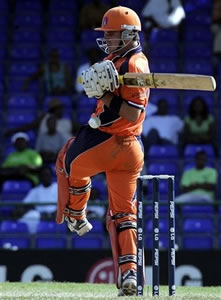2009 ICC World Twenty20 – Group B Preview
Martyn Corrin |
Group B is a fascinating group, featuring two of the perennial unreliable teams and a minnow capable of springing a surprise or two. It is the group containing the hosts, England, the runners-up last time, Pakistan, and one of the top associate nations, the Netherlands. All things considered, Netherlands should be on the Eurostar back home after the group stage, but you would be a brave man to bet much on neither England nor Pakistan slipping up on the proverbial banana skin. It promises to be the most interesting of the groups.
England
England will be hoping to perform better than they did in the 2007 tournament, where they were completely unremarkable. The tournament is on home soil yet you wouldn’t really know it at this point – normally when England plays host to a global event in Football, Cricket or Rugby, there is a lot of hype and false expectation. This summer, though, cricketing eyes or on the Ashes and it is quite conceivable that this may extend to the players. England will enter the tournament with a pretty poor record in the format. Twenty20 may have originated in England, but like in most sports, they have been quickly overtaken. The squad last time was comprised largely of domestic Twenty20 successes, the approach has been somewhat different this time; the bulk of the squad are recognised internationals of at least some repute. It is not a squad which will have any of the opposition captains shaking with fear and England will do well to still be in the tournament come the semi-finals.
Perhaps the most notable thing about this England side is the fact that they will be captained by Paul Collingwood. You may remember that Collingwood ‘resigned’ from the limited-overs captaincy on the same day that Michael Vaughan quit the Test captaincy last summer. Collingwood was hardly distinguished in his previous captaincy spell, in fact it will probably only be remembered for the controversial run-out of Grant Elliott. Collingwood, though, is one of England’s finest Twenty20 players, and without Flintoff there will be a lot of pressure on him to perform with both bat and ball. The other all-rounders in the squad will also be key to England’s chances of progression; these are not short in numbers but perhaps in stature: Graham Napier, Luke Wright, Adil Rashid, Ravi Bopara, Dimi Mascarenhas and if one was being cheeky you could also mention Stuart Broad and Graeme Swann. Whilst these names may not be superstars, balance certainly shouldn’t be a problem for England.
When looking at an England squad prior to a series of any kind, Pietersen is usually mentioned as the key man. Whilst opposition bowlers won’t exactly relish bowling to him, Pietersen has not exactly set the world alight in Twenty20. You would imagine that he would, given the destructive way he plays both of the longer games, however he has passed fifty only once in Twenty20 internationals; that was against Zimbabwe in the last tournament. He also failed to do much at all in the IPL. Therefore it is difficult to foresee big totals from England, it is hard to know exactly what to expect from Rob Key who will be making his first England appearance in a good few years. Eoin Morgan, controversially transferred from Ireland will look to make an impression, and Bopara and Shah will fancy themselves for runs. Perhaps the most interesting player to watch out for when England bat will be Graham Napier. He is not the most talented batsman in the world by any means, and may well get out trying to slog everything out of the country, but if he gets it right he might just score a big one somewhere. Watch out.
A lot of questions will be asked of England’s bowling in the tournament. Stuart Broad and James Anderson are enjoying some accolades this summer and will likely be the spearheads once again in Flintoff’s absence. Although they will take wickets, it is hard to see either of them keeping it too tight in this format, so Collingwood will probably need to call on himself for four overs a game. Sidebottom is in the squad and should be able to manage the small amount of overs required in a Twenty20 game – he will certainly hope he gets the chance to remind the selectors what he is all about ahead of the Ashes.
And so we come full circle. It is hard to imagine England doing too much here, as players’ minds will surely be trained on the visit of the Australians a month on from this competition. In reality though, the bigger problem is that England simply don’t know what their best team is in this format – James Foster, the wicketkeeper, has never played for England in this form of the game and is the sole wicketkeeper. This sums up the fact that it has not been planned for in the same way that a 50-over World Cup might be. Nobody will be expecting for England to still be in the competition come the semi-finals.
Players to watch: Paul Collingwood, Graham Napier, Stuart Broad
Pakistan
Pakistan made the final last time out before losing out to their arch-rivals India. Amidst all the chaos that has been Pakistani cricket over recent years it would be easy to write them off; after all they have barely played a Test match and haven’t done too much in one-day internationals. However, their record in Twenty20 is fantastic; they have won thirteen out of seventeen games, with just three losses and one tie. This is second to none and it would be a foolish team who underestimated Pakistan.
The Pakistan squad contains some aggressive batsmen that can strike at an impressive rate. The quickest scorer amongst them is Fawad Alam, still only 23. He has only played a few matches for the side, but has struck at nearly 2 runs per ball and only been dismissed once. He is joined by Shahid Afridi, whose Twenty20 record with the bat is pretty poor, but can be counted on to score quick runs when the mood fits. Imran Nazir is also not short of a quick run or two, and opposition bowlers won’t look forwards to bowling to him. Another key batsman in this form of the game is all-rounder Shoaib Malik. If Pakistan are to go far in this tournament they will need him at his best – his contributions with the ball will also be important.
Their key batsman, though, is surely none other than Misbah ul-Haq. Whilst his strike rate does not match the aforementioned batsmen, his average tops 50, this is quite a feat in Twenty20 cricket. Misbah is fondly remembered for his impressive efforts in the last tournament, he was one of the real stars and came close to winning the trophy for Pakistan before being caught out in the final over. He will be hoping to enjoy himself in England, and just last a few balls longer in the final!
They will be skippered by Younis Khan. It is fair to see that Younis has never set the world alight in limited-overs cricket. You certainly won’t be expecting him to score a fifty from twelve balls at any point, but he is a classy batsman who it is hard to ever bet against. Khan will happily sit in the background while his colleagues crack the ball to all parts of England.
Pakistan’s bowling attack is not as strong as it could have been, following the highly-publicised withdrawal of Shoaib Akhtar from the squad with medical problems. However he wasn’t the only dangerous bowler in the squad. Umar Gul’s record is fantastic in the format, with a bowling average of just over ten and economy under five. Gul is fighting the fight for Twenty20 activists everywhere who point out that wickets don’t make a difference in the format. He will be joined in the attack by Shoaib Malik, whose offpsin has proved to be highly successful in the format. He will bowl spin most likely in tandem with the mercurial Afridi, renowned perhaps best for his six-hitting but undoubtedly more impressive with the ball in hand. Akhtar himself was replaced in the squad by Rao Iftikhar Anjum; it is not quite a like-for-like replacement, given Akhtar’s lightning pace, but Rao has given a decent account of himself when he has previously been called into Pakistan squads. However, in the last ODI World Cup it was fairly notable that he struggled at the death, which doesn’t bode well for a Twenty20 tournament. He has played a couple of internationals beforehand and didn’t disgrace himself, though.
Pakistan’s squad may not be made up of household names like some of the squads of days gone by – this is by and large because of the lack of cricket that they have been able to play, rather than the quality of the side itself. They are a highly impressive Twenty20 unit, with players capable of excelling with bat and ball. For them to win, players like Misbah, Afridi and Malik will need to be at their best. It wouldn’t be an enormous surprise if they were to lift the trophy though.
Players to watch: Umar Gul, Shoaib Malik, Misbah ul-Haq
Netherlands
It is easy to look at the Netherlands and think that they are just in England to make up the numbers. They will have been pleased to have been drawn in a group with teams as unpredictable as England and Pakistan, and the great thing about being an associate in a tournament like this is you are in a win-win situation. There will be no disgrace felt if the Netherlands are on their way back home after two games, they can go out, enjoy their cricket and see what happens. They qualified comfortably though, outclassing every other team in the qualifiers, with the exception of Ireland – the final qualifier between the two was abandoned without a ball being bowled, due to rain.That being said, their fate will surely be decided by whether England or Pakistan turn up or not.
The man that gets talked about most for the Netherlands is the South African-born Ryan ten Doeschate. RTD, as his fans affectionately call him, has only played a handful of Twenty20 internationals, but has impressed in them. It will be a little bit different playing against England and Pakistan than it was playing Canada and Kenya, though. His domestic record isn’t overly frightening with either bat or ball in this format (especially compared with his records in the longer forms), but he can score at a decent rate and take wickets. Collingwood and Khan will be wary of him.
Another famous name in the squad is that of Dirk Nannes. Nannes is Australian by birth but Dutch by heritage and pledged his allegiance to his parents’ land after repeated non-selections from Australia. Many Australia fans are a little upset at Nannes turning out for the Dutch, he is a dangerous bowler who was thought highly of enough to earn an IPL contract with the Delhi Daredevils. He played in 13 of their games and took 15 wickets, proving himself to be one of their key players. He was also part of the Middlesex team that won the Twenty20 Cup in England in 2008. Nannes has a very good Twenty20 pedigree and the Netherlands’ best chance of an upset probably rests on Nannes taking a good haul against England or Pakistan, thus leading to a collapse.
Another key bowler is Edgar Schiferli. Not much is known about him in the shortest game, as he has only played four Twenty20 matches, however his List A record has been superlative in 2009. In ten matches in world cup qualifying, Schiferli took 24 wickets @ 17.38 with an economy of 4.17 to take home the Player of the Tournament award. He showed remarkable consistency, recording figures of 3/45, 3/43, 4/49, 4/37, and 4/23 in a crucial game against Kenya. At 33, he’s hitting top form just a little too late for a first-class career, but is experience could prove very useful. As Nannes’s new ball partner, he’s certainly no pushover. The main problem that the Netherlands will face is the fact that outside of ten Doeschate, Nannes and Schiferli, their bowling doesn’t have much to offer. They are lacking in the spin department, with no real spinner of note.
The Netherlands batting is relatively strong, Eric Szwarczynski will open the batting alongside Darren Reekers. They have decent if not outstanding records and will probably be followed ten Doeschate, Dan van Bunge and Peter Borren. None of these or any of the other Dutch batsmen are coming into the tournament with huge expectations, they will certainly be hoping for their bowlers to do a job and give them half a chance to chase something down. However in the recent World Cup qualifying campaign, their leading run scorer was not ten Doeschate but the 19-year-old Alexei Kervezee, who scored 461 runs in ten matches @ 51.22. The Namibian-born youngster, who plays county cricket for Worcestershire, is included in the squad despite never having played a single official Twenty20 match.
Another interesting thing to note about the Dutch is that they are captained by a specialist wicketkeeper, Jeroen Smits. He bats at ten but his keeping is second to none. He is worth keeping an eye on in this tourrnament.
Not a lot is known about the Twenty20 pedigree of the Dutch side, largely because they haven’t played a lot of it. They will certainly be hoping to do much more than make up the numbers here. It is Twenty20 and anything can happen – don’t count against the Dutch still being in the mixer come the Super 8 stage!
Players to watch: Ryan ten Doeschate, Edgar Schiferli, Dirk Nannes





Leave a comment